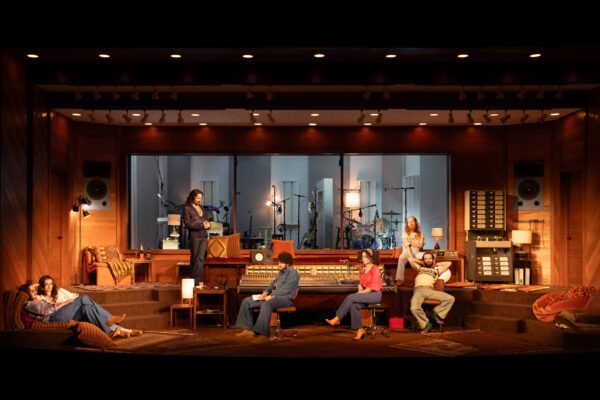A STEREOPHONIC SHOW WITH A MONOPHONIC SCRIPT
Stereophonic was so evenly cherished by critics in its Off-Broadway run at Playwrights Horizons that it transferred to Broadway, where it opened tonight at The Golden Theatre. Why? The jury is still out.
Andrew R. Butler and Eli Gelb
It takes place in a Californian recording music studio in 1976 where an up-and-coming band is recording a new album. Their first one is climbing the charts and they are becoming famous but they need to finish the second one to appease the record company. Just like any creative work made by a team, studio recording sessions are an exercise in frustration and you have to deal with constant unexpected problems; in our case there is equipment failure, noise interference, drug and booze excess, jealousy, egos, and performance issues. It takes the band a year to finish the album, for us more than three hours of predictable events
Juliana Canfield
The band is made of five elements: Tom Pecinka is Peter, the band guitarist, vocalist and producer, basically the leader of the band with a big ego that Pecinka plays with a passive-aggressive approach. Peter is in a long troubled relationship with Sara (Sarah Pidgeon) the singer, songwriter, and rising star of the band who suffers from low self-esteem. The other distraught couple is British: Reg (Will Brill), the bass guitarist, and his wife Holly (a graceful Juliana Canfield), a piano player, vocalist and the only apparently balanced member of the group. Chris Stack is home-sick Simon, who plays drums and left his family in England to follow Reg and Holly for what was supposed to be a six-month experiment with this new American band and turned out to be a three-year affair.
Sarah Pidgeon
They are stuck in the studio and what happens is exactly what you can expect: they fight all the way to the finish line. Peter is jealous of Sara’s talent and rising fame, and like any other narcissistic band leader pushes to control every music detail, driving everybody crazy. Pidgeon, as Sara, acts more like a teen than a young artist who has been writing poetic lyrics, composing, and recording for many years. Probably because her dialogue is superficial, aside from a couple of lines, but her singing is ideal for the part and she embodies the perfect folk vocalist of the times. Reg is the crass musician who is talented but constantly high, as per any rock band, and Brill does justice to the role. He stumbles, slurs his words, fumbles around, struggles to keep an upright position but he is ready when he needs to play.
The cast
Behind the mixer, Grover, the sound engineer, played by an appropriately awkward Eli Gelb, tries to keep the recording going with very little success and suffering a lot of abuse. Sort of a Harlequin, he comically tries to please all the masters. Charlie, his assistant, played by Andrew R. Butler as an awkward, almost sinister nerd, adds color to the control room and a few jokes to the wait. Stack, as Simon, has a strong stage presence and like Grover is interested in holding everyone together using all possible tools, in his case from flamboyant humor to shouting.
Chris Stack and Will Brill
David Zinn’s wood and glass set is excellent, it gives us the intimacy of a recording studio and a perfect view of both the control room – with its ‘70s couches and pillows where the band hangs out between takes – and the soundproof stage where they perform, so we can feel the action and lack of. Lighting designer Jiyoun Chang keeps a warm atmosphere throughout the play, enhancing the claustrophobic feeling, and brings the soundproof stage to life when needed. Enver Chakartash’s 70s costumes fit the folk-rock scene and include a good variety of bell bottom pants, vests, leather boots, and colorful shirts to remind us of the times, something we would otherwise forget because breakups and recording sessions’ bickering are the same today.
Juliana Canfield
What about the music? The original songs by Will Butler (former member of the indie rock band Arcade Fire) work perfectly with the story but they are barely there. Between the stop-and-go and the squabbling between musicians, we get to hear a few songs mostly fragmented, and it’s a shame because they sound interesting. Sound designer Ryan Rumery flawlessly mixed all sounds so we clearly hear both sides of the recording studio. (It was announced today that the full songs will be on an Original Broadway Cast album.)
The Cast
Unfortunately the action is diluted by Daniel Aukin’s slow direction (he could cut an hour off without changing the plot) and the levity of the script by David Adjmi. It does not have the realism of a docu-drama nor enough witty jokes to be a dark comedy; it is not a musical play because there aren’t enough songs, but I like experiments, and I don’t mean to find a box for it.
Tom Pecinka and Sarah Pidgeon
My problem is that Stereophonic didn’t give me a reason to care for any of the characters; they are stereotypical band members with stereotypical lives. The plot obviously mirrors the year Fleetwood Mac spent recording the 1977 album Rumours — still I am sure we could find more grit and passion in that story than in this play. I don’t think Stevie Nicks would be as trivial as Sara, and I am not an FM fan, so the similarity has not spoiled my viewing. To be fair, a large portion of the audience laughed throughout the play, and the ovation lasted for a very long time. Fleetwood Mac’s fans? Arcade Fire’s fans? Certainly they saw something I didn’t.

The Cast
photos by Julieta Cervantes
StereophonicPlay.com
facebook.com/stereophonicplay
www.instagram.com/stereophonicplay
www.tiktok.com/@stereophonicplay
twitter.com/stereobway

